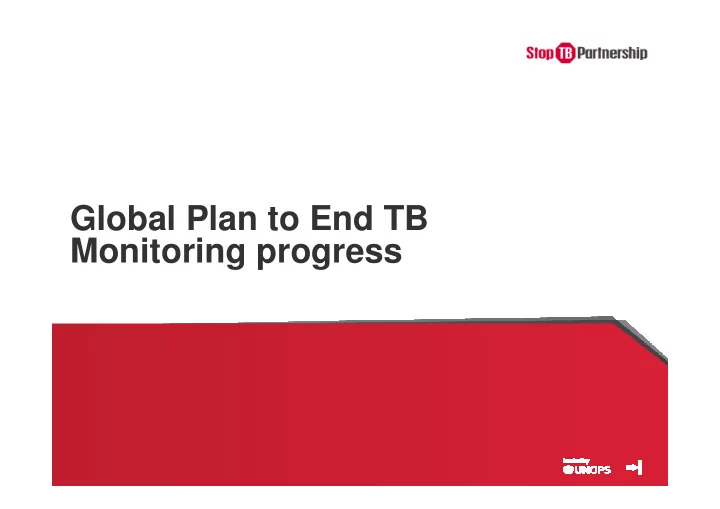

Global Plan to End TB Monitoring progress
How Global Plan is being used?...1 United Nations High-Level Meeting on HIV/AIDS in June 2016 Heads of State and Governments endorse UN Political Declaration and commit to: • “Funding and implementing to achieve targets set in the Stop TB Partnership’s Global Plan to End TB 2016-2020” • “Achieve the Global Plan 90-90-90 targets” www.stoptb.org www.stoptb.org
How Global Plan is being used?....2 Political commitment • Endorsement/Commitment to targets • African Region Ministers of Health • Parliamentarians (Global TB Summit and African TB Caucus) • Global Fund • Investment case • Strategy • Targets • Country level advocacy • Country level impact assessment and resource needs estimation www.stoptb.org www.stoptb.org
Monitoring of Global Plan implementation and Funding Launched 2015 • Cape Town Board asked the secretariat to monitor and report annually to the Board DP 27-8 www.stoptb.org www.stoptb.org
Key elements of Global Plan that requires monitoring Four key reports 1. Targets 2. Policies 3. Finances 4. Research www.stoptb.org www.stoptb.org
Main Targets Modeling done for Global Plan shows that achieving 90% coverage as soon as possible but not later than 2025 will set the world on course to meet the End TB Strategy milestones for 2020 and 2025. www.stoptb.org www.stoptb.org
Other aspects related to targets and progress …1 Eight areas of Paradigm Shift Human Community Changed rights and - and and more Mindset gender- patient- inclusive based driven leadership approach approach New, Innovative Integrated innovative Investment TB health and in socio- programme systems fit optimized economic s equipped for purpose approach to actions to end TB funding www.stoptb.org www.stoptb.org
Other aspects related to targets and progress …2 Top 10 indicators www.stoptb.org www.stoptb.org
Annual Monitoring Report Series 1 Targets and paradigm shift • Progress against 90-(90)-90 targets What will be • Action for key population groups measured? • Paradigm shift – examples • WHO reports Where will the • Other reports (e.g. ECDC: prisoners, migrants; TIMS miners) data and information be • NTP reports and review of literature sourced from? • Survey questions to NTP managers (especially on 2 nd 90) www.stoptb.org www.stoptb.org
Policies • Bold policies are needed for scale up and impact – many countries lagging behind. • A pillar of the WHO End TB Strategy and Global Plan to End TB is focused on adoption and implementations of latest policies • Out of Step report 2015 was well received by governments, civil society and other stakeholders, and widely referenced. www.stoptb.org www.stoptb.org
Annual monitoring report series 2 • Stop TB and MSF will launch a ‘ Step Up for TB Campaign’ –huge wall poster and website to be launched at Union conference in Liverpool. Visit www.stepupfortb.org to sign up. • Out of Step Report will be made annual • Will measure progress on country adoption policies vis-à-vis internationally recommended policies • Number of policies selected will be widened, as well as number of countries. www.stoptb.org www.stoptb.org
Finances www.stoptb.org www.stoptb.org
Annual monitoring report series 3 Finances • Availability of funding for implementation • Domestic/external What will be • Country groupings measured ? • Trends • Expenditure vs budgets • WHO Where will • Global fund the data and information • World bank be sourced • IHME from ? • Survey questions to NTP managers www.stoptb.org www.stoptb.org
Research funding • Stop TB & TAG report on Research Funding already in place. www.stoptb.org www.stoptb.org
Annual monitoring report series 4 • Research funding report will continue as an annual publication • Greater engagement with the New Tool Working Groups www.stoptb.org www.stoptb.org
Timeline of activities Launch around WHA 2017 Aug Sept Oct Nov Dec Jan Feb March April May 90-(90)-90 Draft of data reports WHO collection 2016 report Review & Editing Survey for NTP Collection of data on key populations Layout, graphic designing, Analysis and results social media, printing www.stoptb.org
Some principles • As much as possible existing data and information will be used • Primary data collection will be limited to those areas where data is incomplete/absent • Language will be non-technical and presentation will be simple and high level • Both quantitative and qualitative information will be presented with case studies to inspire action www.stoptb.org
Thank you
Recommend
More recommend